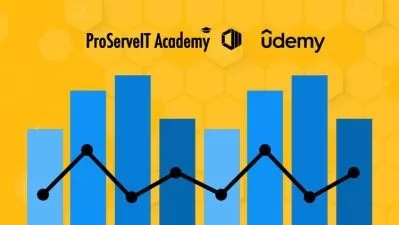Certified Analytics Professional (CAP) Exam Prep Course
EDUCBA Bridging the Gap
7:55:14
Description
Master the skills and knowledge to ace the CAP exam and advance your career as a Certified Analytics Professional!
What You'll Learn?
- Understanding the CAP certification process and its benefits.
- Mastering business problem framing and analytical problem-solving techniques.
- Gaining proficiency in data science, including data acquisition, preparation, analysis, and feature engineering.
- Applying the Five E's of the CAP exam and developing essential soft skills for the certification.
- Effectively using data visualization tools to communicate insights and create impactful data stories.
- Learning different analytics methodologies, validating models, and using predictive and simulation techniques.
- Familiarizing with CAP-specific terminology and concepts like regression, predictive, and prescriptive analytics.
- By the end of the course, students will be fully equipped to pass the CAP exam and advance their careers in the field of analytics.
Who is this for?
What You Need to Know?
More details
DescriptionIntroduction:
The Certified Analytics Professional (CAP) certification is a globally recognized credential that validates your expertise in analytics. This course is designed to help you master the essential topics and skills needed to excel in the CAP exam. You will gain insights into business problem framing, analytical problem-solving, data science, and the importance of data visualization. Whether you are an aspiring data scientist, an analytics professional, or someone aiming to advance their career with a CAP certification, this course offers structured learning to help you succeed.
Section 1: Introduction to CAP Exams
The course begins with an introduction to the CAP certification, outlining the benefits of earning this credential for analytics professionals. You'll gain a deep understanding of the CAP certification process and how it can boost your career. Additionally, you'll learn the relevance of the certification across different industries and how it serves as a benchmark for analytic skills.
Section 2: Understanding Objectives
In this section, you will dive into the key objectives of the CAP exam and their respective weightages. Lectures cover topics such as business problem framing, analytical problem framing, and the methodological approach to solving business challenges. The concept of "knowledge statements" and effective presentation techniques will also be explored, helping you understand what the exam evaluators are looking for.
Section 3: Understanding Business Problem Identification
This section focuses on the critical task of identifying business problems and conducting stakeholder analysis. You’ll learn how to refine problem statements and agree on initial business benefits with stakeholders. The goal is to ensure that you can clearly define problems before jumping into analytical solutions.
Section 4: Further Reading on Business Problem Framing
Here, you will be guided through the process of writing effective problem statements. This section emphasizes problem-solving techniques, the process of defining a problem, and the powerful impact of re-framing problems. You'll be equipped with questions to frame business problems more effectively, setting the stage for impactful analytical work.
Section 5: Analytical Problem
This section delves into the process of analytical problem framing and introduces you to frameworks such as Kano’s Requirement Model. You’ll explore key success metrics, how to propose drivers and relationships between inputs, and understand the core principles that guide successful analytics problem framing.
Section 6: Certified Analyst Professional Training – Data Science
Data science plays a crucial role in CAP certification. This section covers data science fundamentals and explores the differences between business intelligence (BI) and data science. You’ll learn the step-by-step process of acquiring and preparing data, analyzing it, and transforming data into actionable insights. Key concepts like feature engineering, dimensionality reduction, and model validation are also discussed.
Section 7: Certified Analyst Professional Training – Five E’s of CAP Exam
This section introduces the Five E’s of the CAP exam, focusing on the key skills and soft skills required to pass the exam. You’ll learn how to clarify the analytical process, understand CAP-specific terminology, and apply regression, predictive, and prescriptive analytics. Real-world examples will demonstrate the practical applications of these skills.
Section 8: Data Visualization – CAP Certification
In this section, you’ll explore the importance of data visualization in presenting analytics results. Learn common data visualization techniques such as decision trees and heat maps, and how to effectively communicate data insights through data storytelling. Data quality, cleaning, and building a data mart are also discussed, providing you with the tools to create meaningful, accurate visual representations.
Section 9: Analytics Methodology and Test Analytics Model
The final section focuses on different analytics methodologies and how to validate analytics models. You'll learn about predictive methodologies, simulation techniques, and software tool selection. This section ensures you are prepared to test, refine, and implement analytics models in a real-world context.
Conclusion:
By the end of this course, you will have a solid understanding of the key components required to excel in the CAP exam. You will be proficient in framing business and analytical problems, applying data science techniques, utilizing data visualization tools, and validating analytics models. This comprehensive training will equip you with the skills necessary to become a Certified Analytics Professional.
Who this course is for:
- Aspiring Analysts: Individuals looking to start a career in analytics and seeking to obtain the Certified Analytics Professional (CAP) certification.
- Data Science Professionals: Those currently working in data science or related fields who wish to deepen their understanding of analytics methodologies and improve their skills.
- Business Professionals: Managers and decision-makers who want to enhance their analytical skills to make data-driven decisions within their organizations.
- Students: University or college students pursuing degrees in business, data science, statistics, or related fields who are interested in gaining practical knowledge and certification in analytics.
- Career Changers: Professionals from non-analytical backgrounds seeking to transition into data analytics roles and wanting a comprehensive understanding of the analytics process.
Introduction:
The Certified Analytics Professional (CAP) certification is a globally recognized credential that validates your expertise in analytics. This course is designed to help you master the essential topics and skills needed to excel in the CAP exam. You will gain insights into business problem framing, analytical problem-solving, data science, and the importance of data visualization. Whether you are an aspiring data scientist, an analytics professional, or someone aiming to advance their career with a CAP certification, this course offers structured learning to help you succeed.
Section 1: Introduction to CAP Exams
The course begins with an introduction to the CAP certification, outlining the benefits of earning this credential for analytics professionals. You'll gain a deep understanding of the CAP certification process and how it can boost your career. Additionally, you'll learn the relevance of the certification across different industries and how it serves as a benchmark for analytic skills.
Section 2: Understanding Objectives
In this section, you will dive into the key objectives of the CAP exam and their respective weightages. Lectures cover topics such as business problem framing, analytical problem framing, and the methodological approach to solving business challenges. The concept of "knowledge statements" and effective presentation techniques will also be explored, helping you understand what the exam evaluators are looking for.
Section 3: Understanding Business Problem Identification
This section focuses on the critical task of identifying business problems and conducting stakeholder analysis. You’ll learn how to refine problem statements and agree on initial business benefits with stakeholders. The goal is to ensure that you can clearly define problems before jumping into analytical solutions.
Section 4: Further Reading on Business Problem Framing
Here, you will be guided through the process of writing effective problem statements. This section emphasizes problem-solving techniques, the process of defining a problem, and the powerful impact of re-framing problems. You'll be equipped with questions to frame business problems more effectively, setting the stage for impactful analytical work.
Section 5: Analytical Problem
This section delves into the process of analytical problem framing and introduces you to frameworks such as Kano’s Requirement Model. You’ll explore key success metrics, how to propose drivers and relationships between inputs, and understand the core principles that guide successful analytics problem framing.
Section 6: Certified Analyst Professional Training – Data Science
Data science plays a crucial role in CAP certification. This section covers data science fundamentals and explores the differences between business intelligence (BI) and data science. You’ll learn the step-by-step process of acquiring and preparing data, analyzing it, and transforming data into actionable insights. Key concepts like feature engineering, dimensionality reduction, and model validation are also discussed.
Section 7: Certified Analyst Professional Training – Five E’s of CAP Exam
This section introduces the Five E’s of the CAP exam, focusing on the key skills and soft skills required to pass the exam. You’ll learn how to clarify the analytical process, understand CAP-specific terminology, and apply regression, predictive, and prescriptive analytics. Real-world examples will demonstrate the practical applications of these skills.
Section 8: Data Visualization – CAP Certification
In this section, you’ll explore the importance of data visualization in presenting analytics results. Learn common data visualization techniques such as decision trees and heat maps, and how to effectively communicate data insights through data storytelling. Data quality, cleaning, and building a data mart are also discussed, providing you with the tools to create meaningful, accurate visual representations.
Section 9: Analytics Methodology and Test Analytics Model
The final section focuses on different analytics methodologies and how to validate analytics models. You'll learn about predictive methodologies, simulation techniques, and software tool selection. This section ensures you are prepared to test, refine, and implement analytics models in a real-world context.
Conclusion:
By the end of this course, you will have a solid understanding of the key components required to excel in the CAP exam. You will be proficient in framing business and analytical problems, applying data science techniques, utilizing data visualization tools, and validating analytics models. This comprehensive training will equip you with the skills necessary to become a Certified Analytics Professional.
Who this course is for:
- Aspiring Analysts: Individuals looking to start a career in analytics and seeking to obtain the Certified Analytics Professional (CAP) certification.
- Data Science Professionals: Those currently working in data science or related fields who wish to deepen their understanding of analytics methodologies and improve their skills.
- Business Professionals: Managers and decision-makers who want to enhance their analytical skills to make data-driven decisions within their organizations.
- Students: University or college students pursuing degrees in business, data science, statistics, or related fields who are interested in gaining practical knowledge and certification in analytics.
- Career Changers: Professionals from non-analytical backgrounds seeking to transition into data analytics roles and wanting a comprehensive understanding of the analytics process.
User Reviews
Rating
EDUCBA Bridging the Gap
Instructor's Courses
Udemy
View courses Udemy- language english
- Training sessions 60
- duration 7:55:14
- Release Date 2025/01/16











